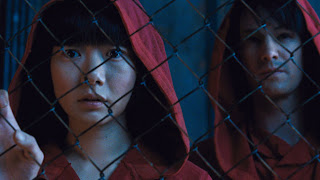Skyfall
5 out of 5
Skyfall is one of the best bond movies in years and perhaps one of the best ever. It makes for one of the most entertaining and satisfying experiences I've had at the movies in recent years. The filmmakers have taken Bond back to his roots while simultaneously exploring new story lines - Bond's backstory/childhood, his relationship to M, the introduction of previous MI6 agents, etc. Skyfall has a fantastic opening credits sequence backed by the perfect Adele. It's got thrilling set pieces that are shot such that you can actually follow the action; unlike Quantum of Solace, where the editing was so quick and choppy that you couldn't possibly follow it all, Skyfall is paced appropriately and well balanced between plot & action. Some of my favorites were the Asia sequences (notably, the fight atop a skyscraper shot in silhouette with brief glimpses of light from the gunfire). I would be remiss not to mention Javier Bardem and his awesome performance as the Bond villain, Raoul Silva. From his long take introduction with that fantastic "rat" parable, to that helluva mouthpiece, the evil version of William Tell shooting the apple off the head, and that creepy laugh, he's created one of my favorite Bond villains who leaves an indelible impression. I've seen the film twice already. It's just so good.
Lincoln
4.5 out of 5
Under the guise of a biopic about Abraham Lincoln, Spielberg's Lincoln is actually several films in one. It's first and foremost a story of bravery and conviction on the part of our founding fathers, and the decision-making that led to the revelatory 13th amendment that ended slavery. It's a story about a quiet man, who often told stories with a smile; a man who didn't have the most extensive educational background, but was a thinker and visionary all the same. It's about a father/husband and his relationship to his family; as in many of Spielberg's films, the relationship of father to son is at the core of the film. It's a film about politics and all of the many people that had a hand in making a historical choice that changed the course of history, a choice that necessitated delicacy and making the right moves with the right people at the right time.
Whether you're a history buff or not, Lincoln is fundamentally a good story. The film reminded me of an extended, feature-length version of the John Adams HBO series. It's "special effects" are good old fashioned storytelling/writing, confident direction, and stuffed with a surprising number of familiar faces in supporting roles. My favorites were Tommy Lee Jones as Thaddeus Stevens (who is absolutely going to get an Oscar nod, along with Daniel Day-Lewis as Lincoln), James Spader, Tim Blake Nelson, John Hawkes, and Jared Harris (who can do no wrong in my mind) as Ulysses S. Grant. This is a film that's assured Oscar recognition, and for good reason.
Perks of Being a Wallflower
4 out of 5
A surprising, emotional coming of age story backed by performances by actors who are mature beyond their years. It intimately captures all the awkwardness, the love, the new friendships, the heartache, and the confusion of those pivotal high school years. It all feels very personal and immediate. Interestingly, the film is written/directed by the very man who wrote the book the movie is based on - Stephen Chbosky. I wonder what that will do to those who always argue that books are better than movies-based-on-books. What happens when author becomes director? A quick Internet search revealed that this isn't the first time this has happened, and I know writers often co-write movie screenplays of their stories. Regardless, Perks of Being a Wallflower creates memorable screen characters who you can actually relate to and care about. And the tunnel scenes are just great.
Life of Pi
3.5 out of 5
Visually breathtaking. This is a film that MUST be seen on the big screen (and in 3D!). BUT, I think the voice-over narration did make it obvious that Life of Pi is a movie-based-on-a-book and weakened the overall effectiveness of the story. Why not get rid of the Canadian reporter (whose role is clearly to mirror the audience and ask all the questions we're meant to ask)? On the other hand, it did mirror the nature of the Indian parable structure it clearly follows. I just felt it was a little heavy-handed at time. However, many of the sequences were quite impressive visually, the story is a good one, and the revelation at the end makes multiple viewings worth considering.
And no, I did not read the book.
Note: I don't own the rights to any of the photos on this website. They're copied here from Google images for entertainment purposes only.
Note: I don't own the rights to any of the photos on this website. They're copied here from Google images for entertainment purposes only.












